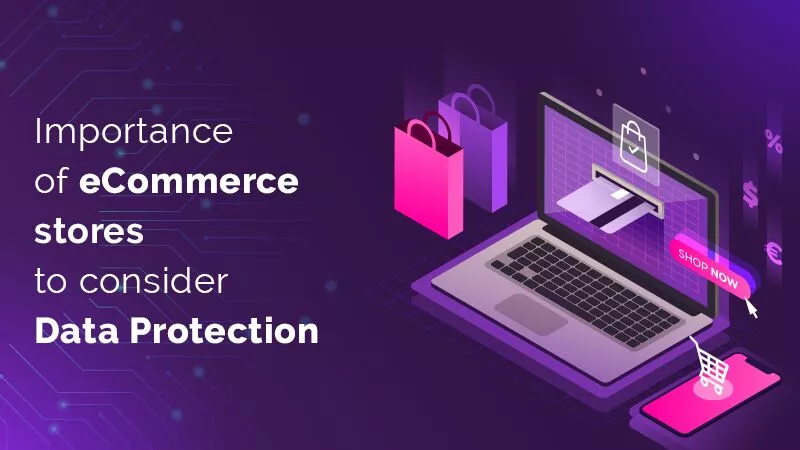Lara is an ordinary working woman in the USA. She’s a regular shopper and keeps exploring new e-commerce platforms. One day she bumped into an online store called www.shopme.com, and absolutely loved an item. All ready to check-out, she entered her banking details and voila a website visitor was converted into a regular customer. A moment of celebration for shopme.com, right?
But after a few days, Lara received a message certifying that her personal bank details have been leaked due to a hack attack on shopme.com. What do you think her reaction would be? Do you think she will ever feel safe in visiting that website no matter how much she admires their products/services? No, right! So, that’s how shopme.com would permanently lose a regular customer due to something they didn’t even do!
So, would you want your website to be trapped in a position similar to www.shopme.com? If not, this article’s for you!
Although the world wide web has made a lot of things possible and accessible, the privacy infringements have made it a dangerous place. We’ve all heard the phrase – “Data is the next big thing”; and by data, we mean your customers’ email, contact number, date of birth, and other private information that they would not be willing to share with any stranger on the road.
As more and more parts of the commerce industry turn towards the internet, cyber security is becoming an issue of concern. In 2019, more than 15 billion data records were exposed. This is a 284% increase from the previous year. Also, one important thing to consider is the economic cost of data breach. On an average, one error can cost a company $3.86 million and takes 280 days to contain. That’s valuable time and dollars that could instead be invested elsewhere to drive revenue and improve your customer experience.
The rising concerns have also pressured governments and organizations across the world to ensure data protection and security of its citizens/members. One such law is the General Data Protection Regulation (GDPR). It is the world’s toughest privacy and security law. Put into effect on May 25, 2018, the GDPR levies harsh penalties against privacy and security standards violation. Sometimes, these fines can go up to tens of millions of euros. Moreover, if your organization processes the data of EU citizens, then you fall under the purview of the GDPR even if you’re not in the EU.

Further, customers are aware of data privacy concerns and value their private information more than anything. They are aware and they are concerned! In fact, problems become deadlier when the data revolves around their bank statements or account details. Nobody would like losing their money in a fraud, right?
That being said, everytime a user visits your Shopify, Magento or Woocommerce based website, they trust you with their privacy and security. Therefore, every business needs to value their customer’s trust by protecting their data. Building an e-commerce platform can be an exciting endeavor for anyone, but ensuring property security is something no one can afford to challenge. Consider the fact that in 2018, out of all the cyber attacks, 32.4% were on online businesses.
As an entrepreneur, the worst mistake you can make is overlooking the protection of your e-commerce website since many such sites get access to plenty of sensitive data. The menace of hacking, phishing, malware, whaling and other cyber attacks is a nightmare for any online business owner. It noy only jeopardizes their brand value but also makes their customers vulnerable to the risk of suffering from fraud or identity theft. Further, if financial data such as credit card details is compromised, casualties for the business can be huge, especially if you’re a small one.The truth is small businesses are better targets because many a time they don’t have enough resources to fully protect their data. And, that’s exactly what cybercriminals need!
E-Commerce security refers to the standard guidelines that make sure all the online transactions are rock-solid secure. Every business needs to establish protocols that safeguard its customers and vendors; basically everyone engaged in online selling and buying of goods and services. In order to gain your customers’ and vendors’ trust, implementing eCommerce security basics is a must.
Thus, putting emphasis on data security is quintessential to maintain good customer retention rates and expand your online business. The prima facie of growing any business is building trust, and if your customers don’t feel safe spending money on your website, your business is going nowhere!
As an ecommerce store, you need to:
- Prevent any activity that shares your customers’ private data with unauthorized third parties.
- Ensure that no data given by your customers is altered or changed.
- Establish authenticity and prove that all the products or services are genuine, and the online platform delivers what it promises.
- Enforce non-repudiation principle with the buyer and sellers following through on the entire transaction.
Why cannot online businesses afford to overlook security?
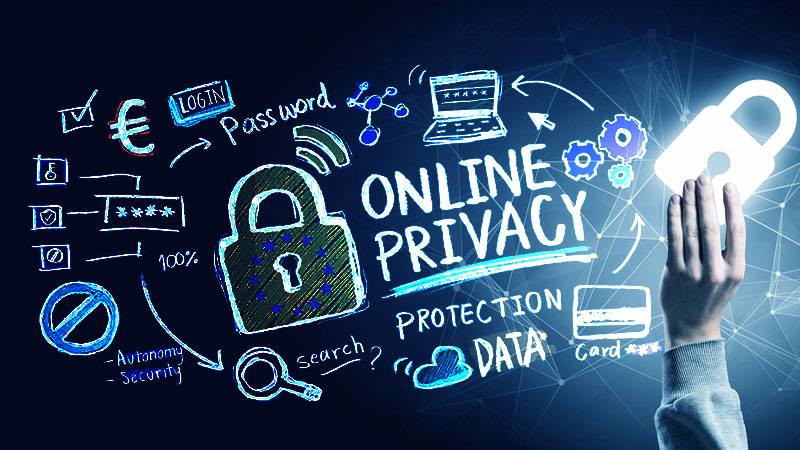
“It takes 20 years to build a reputation and a few minutes of cyber-incident to ruin it.” – Stephane Nappo
Popularity of eCommerce has bolstered with the rise in online transactions. But, it has also invited the unwanted attention of the bad players or hackers. Cyber crime reports reveal that the eCommerce industry is one of the most vulnerable platforms to cybercrimes.
Data attacks leave a disastrous impact on the existence and reputation of a business. Cyber attacks weigh heavily on businesses’ financials, market shares, and customer preferences. It is known that around 60% of small eCommerce shops that experience cyber attacks don’t survive more than six months.
Discovering and securing sensitive data is a challenge for businesses that are new to the digital world. Many use the internet but few know the repercussions of bad practices. Hence, many businesses have bad data management systems that can cause a multitude of problems, from non-compliance to severe data breaches.
Hence, placing tight security measures is crucial for an ecommerce platform, especially if you don’t want your business to close down due to cybercriminals. After all, Rome wasn’t built in a day, right?
How can online stores protect user data?
Thankfully, there are many ways to prevent all this chaos. These preventive measures are easy to implement and secure your website. So, here are a few steps you can take to protect your online business from outside threats and unwanted data infringements.
- Collect less data

The easiest way to protect your users’ sensitive data is to not collect it. Every business should make it a point to only collect data that is essential to run their business and facilitate the transaction. For running an e-commerce platform seamlessly, collecting all data (emails, contact number, credit card details, etc.) might not be essential. You should not collect information just because you can because collected data is always a liability, and can put you in trouble if sacrificed. Apart from losing brand reputation, breach can result in hefty government penalties and charges. Further, your policies should specify access permissions and restrict excess data collection. You need to clearly classify which information is collectible and which is not.
After collection of data, reviewing who has access to what kind of data is equally important. As the business owner or manager, you need to lay strict rules on who can alter the master data. This involves regulating data control powers for admins, customers or vendors. Data access rights are integral to any website’s security, especially in the e-commerce industry.
Moreover, you should definitely avoid storing financial information unless necessary. Any break in this scenario might lead to fraudulent activities and huge losses. Thus, the best way out is to use third-party, encrypted payment providers or checkout tunnels for facilitating financial transactions on your online store. This is a standard procedure for all ecommerce shops. Specialized payment platforms such as Authorize.Net and Paypal have high-level security apparatus to protect your consumers’ financial information.
- Choose a secure platform and encrypt data
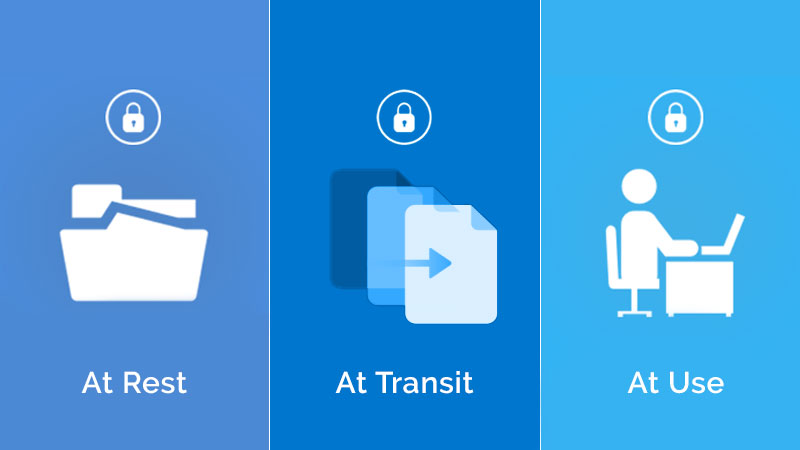
You should choose a safe and secure platform and web host to avoid any menace in the later stages. Most website builders have some security measures but their effectiveness varies from business to business. Thus, you should do your research and select the host and platform combination that offers you optimal protection from the most common threats such as SQL injections.
Sensitive data like passwords can be safely stored using the power of encryption. Intrusion prevention systems like firewalls can be implemented to make sure your website’s security is air-tight. Moreover, hashing is another technique that adds an additional security layer to your system. It’s mostly found in network communication and makes your system tamper-proof.
- Get an SSL certificate (HTTPS)
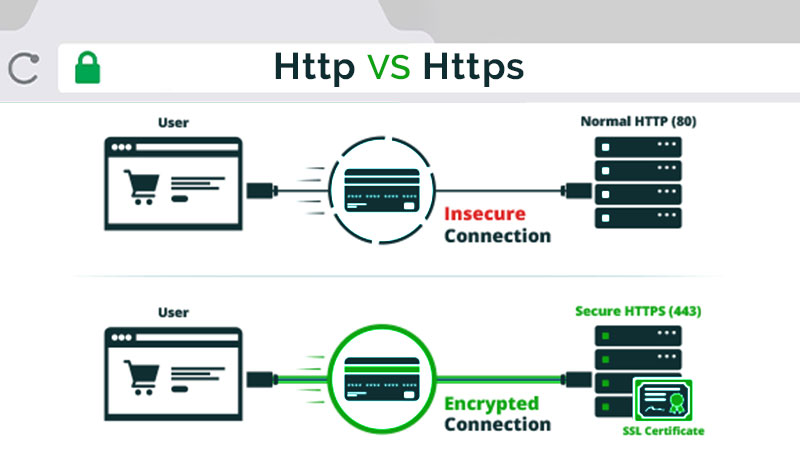
As an online business owner, you must be aware of the PCI’s Data Security Standards.
The PCI-DSS guidelines are universally accepted. It is like a guiding force for e-commerce security. Thus, if your website transacts money online then PCI DSS compliance is extremely important. These standards are also adopted by all popular credit card companies globally. Non HTTPS websites display a “Not Secure” warning sign when customers visit them. It is common for such websites to get attacked.
An SSL (Secured Sockets Layer) certificate helps comply with security standards and build customer trust, especially for an ecommerce website. In fact, having an SSL certification is mandatory for all online commerce sites under the Payment Card Industry (PCI) Data Security Standard. It helps to encrypt the data between your website and the user’s web browser so that nobody except you and the user could read it; hence, securing it from any potential hackers. It ensures that information reaches only the intended receiver and no one else.
Without an SSL encryption, anybody between the sender and receiver can access sensitive information. This exposes your users’ passwords, credit card numbers, usernames, and other private information to potential hackers.
The HTTPS also plays an important role in increasing your Google search ranking and keyword recognition. Guarantees work amazingly well when you’re running an online business. So, post the configuration, the address bar of your shop will get a green padlock symbol, amplifying the trustworthiness of the website.
- Perform SQL checks regularly

Structured Query Language or SQL is a domain-specific coding language used to access, design and manage databases. People can access unauthorized data, execute rogue commands (such as data retrieval) and manipulate databases using SQL. Thus, regularly checking for SQL injections is extremely crucial to make sure your website data isn’t vulnerable to any manipulator. These checks can be performed using free site scanners or premium scanners, depending on the platform you use. So, choose a software that will help you protect your website from these injections and run daily checks. This way, you’ll be able to identify vulnerabilities before anyone can exploit them.
- Timely update your application and software

As hackers find gateways, app developers find fixes.
Every application has some loopholes that can be exploited by hackers to steal crucial information. Updating apps and software is essential since older versions are hack prone. In other words, they can be easily tracked and abused by attackers. Many free plugins and themes also act as a gateway to malicious hackers.
The best way to avoid any loss of data is to keep your system or websites updated and adequately secured with new preventive measures as soon as they are released. New updates are released regularly and often include crucial security patches. Premium themes are more secure and advanced. Moreover, using the latest version is highly recommended for CMS (content management system) users. The updates make it more secure, fix bugs, and incorporate new features, which in turn, improves the functionality of your website. Also, if your app/software isn’t automatically updated, you would have to pay extra attention to manually update it.
- Data Backup

Backing up data is not a way to stop hackers from tampering with your website. It’s just a way to minimize or reduce the damage if any malicious activity takes control. Backups are one of the best strategies to protect information from being entirely lost or corrupted. Thus, backing up is a good business practice to perform as often as possible. Shop owners do it on various intervals, ranging from daily to monthly, depending upon how valuable is their database.
For ecommerce stores, data backup plans are extremely important. They make sure any data loss doesn’t convert into loss of revenue. Data loss on account of any malicious activity or human error can lead to frequent downtime and higher costs, if you do not have a proper recovery plan. Any fully-functioning ecommerce platform needs a regular backup system to safeguard information such as themes, customer data, orders, inventories, product categories, etc.
Most website builders set up automatic backups. This saves time and energy as people don’t have to remember manually backing up the database.
- Use a Website Application Firewall
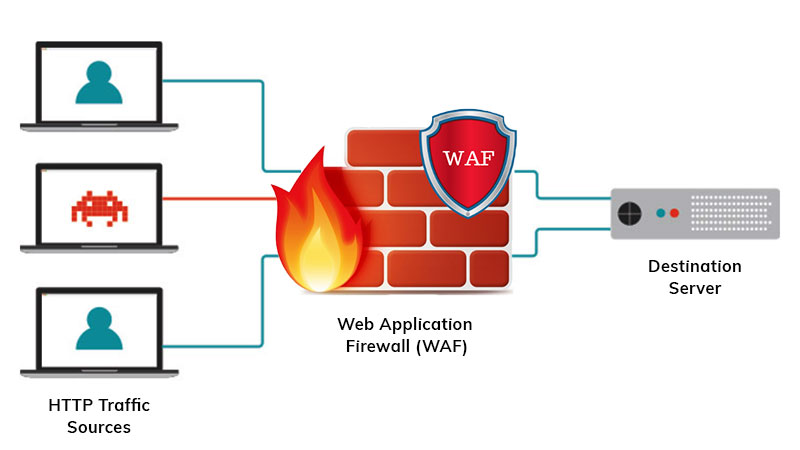
A website Application Firewall or WAF levels up your online business’ security and safety. It reduces the risk of a DoS (Denial of Service) or DDos (Distributed Denial of Service) attack, brute force attempts, as well as any other hacking activities. WAF also undertakes the responsibility to secure your shop from SQL injections, forgery requests and XSS (Cross-site scripting). Choose a website application firewall vendor who fits your needs and budget. You should make it a point to use only trusted e-commerce software and plugins to let only selective trusted traffic go through your website.
What’s the conclusion?
Over the years, security breaches have become more and more common with ecommerce websites being no exception. Having a protected website is crucial for both your customers and your business. Hackers can target any website, but implementing these precautions might reduce the chances of that website being yours. As a business owner, you’re responsible to shield consumers’ information by taking adequate preventive and protective protocols. This safeguards the interests of your store, customers, and other affiliated parties. After all, eCommerce data protection is all about making your business and your customers feel safe and taken care of.

